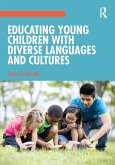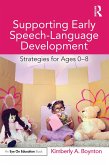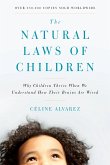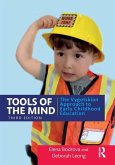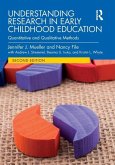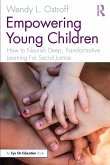Nancy Sall, Catherine Hall Rikhye, Darnell Carr Newsum
Sharing Perspectives for Educating Young Children with Disabilities
Developing Family and Professional Partnerships
Nancy Sall, Catherine Hall Rikhye, Darnell Carr Newsum
Sharing Perspectives for Educating Young Children with Disabilities
Developing Family and Professional Partnerships
- Broschiertes Buch
- Merkliste
- Auf die Merkliste
- Bewerten Bewerten
- Teilen
- Produkt teilen
- Produkterinnerung
- Produkterinnerung
This important book is an exploration of the ways parents, teachers, and academics view the development and schooling of young children with disabilities.
Andere Kunden interessierten sich auch für
![Educating Young Children with Diverse Languages and Cultures Educating Young Children with Diverse Languages and Cultures]() Karen N. NemethEducating Young Children with Diverse Languages and Cultures62,99 €
Karen N. NemethEducating Young Children with Diverse Languages and Cultures62,99 €![Supporting Early Speech-Language Development Supporting Early Speech-Language Development]() Kimberly BoyntonSupporting Early Speech-Language Development32,99 €
Kimberly BoyntonSupporting Early Speech-Language Development32,99 €![Children's Spirituality in Early Childhood Education Children's Spirituality in Early Childhood Education]() Jennifer Mata-McMahonChildren's Spirituality in Early Childhood Education45,99 €
Jennifer Mata-McMahonChildren's Spirituality in Early Childhood Education45,99 €![The Natural Laws of Children: Why Children Thrive When We Understand How Their Brains Are Wired The Natural Laws of Children: Why Children Thrive When We Understand How Their Brains Are Wired]() Celine AlvarezThe Natural Laws of Children: Why Children Thrive When We Understand How Their Brains Are Wired25,99 €
Celine AlvarezThe Natural Laws of Children: Why Children Thrive When We Understand How Their Brains Are Wired25,99 €![Tools of the Mind Tools of the Mind]() Elena BodrovaTools of the Mind45,99 €
Elena BodrovaTools of the Mind45,99 €![Understanding Research in Early Childhood Education Understanding Research in Early Childhood Education]() Jennifer J. MuellerUnderstanding Research in Early Childhood Education45,99 €
Jennifer J. MuellerUnderstanding Research in Early Childhood Education45,99 €![Empowering Young Children Empowering Young Children]() Wendy OstroffEmpowering Young Children46,99 €
Wendy OstroffEmpowering Young Children46,99 €-
-
-
This important book is an exploration of the ways parents, teachers, and academics view the development and schooling of young children with disabilities.
Hinweis: Dieser Artikel kann nur an eine deutsche Lieferadresse ausgeliefert werden.
Hinweis: Dieser Artikel kann nur an eine deutsche Lieferadresse ausgeliefert werden.
Produktdetails
- Produktdetails
- Verlag: Taylor & Francis Ltd
- Seitenzahl: 150
- Erscheinungstermin: 6. September 2024
- Englisch
- Abmessung: 229mm x 152mm x 8mm
- Gewicht: 224g
- ISBN-13: 9781032774268
- ISBN-10: 1032774266
- Artikelnr.: 70351537
- Herstellerkennzeichnung
- Libri GmbH
- Europaallee 1
- 36244 Bad Hersfeld
- gpsr@libri.de
- Verlag: Taylor & Francis Ltd
- Seitenzahl: 150
- Erscheinungstermin: 6. September 2024
- Englisch
- Abmessung: 229mm x 152mm x 8mm
- Gewicht: 224g
- ISBN-13: 9781032774268
- ISBN-10: 1032774266
- Artikelnr.: 70351537
- Herstellerkennzeichnung
- Libri GmbH
- Europaallee 1
- 36244 Bad Hersfeld
- gpsr@libri.de
Nancy Sall, Ed.D., Assistant Professor, Department of Special Education at Hunter College, City University of New York, USA. Nancy previously was a faculty lecturer at Teachers College, Columbia University. She has worked on numerous federally funded research projects on the communication and social development of children with significant disabilities. Catherine Hall Rikhye, Ed.D., Special Education Curriculum Consultant, NYC Public Schools, USA. Cathy was a faculty lecturer at Teachers College, Columbia University, and Associate Professor of Special Education at Hunter College and Dominican College in NY. She created and directed the Office of Inclusive Education, NYC Department of Education. Darnell Carr Newsum, MBA., Diversity, Equity & Inclusion Consultant, SPARK/Boston Children's Hospital, USA. Darnell is the parent of two children with Autism and a parent advocate, serving on the boards of two schools in New York City. She speaks at colleges and organizations about issues impacting families of children with autism. Samreen Hoda, M.A., Assessment Editor, Curriculum Associates iReady, USA. Samreen designs large-scale early literacy assessments while incorporating cultural and linguistic responsiveness. She taught students with autism and other developmental disabilities in New York City Public Schools where she also served as a mentor and supervisor for novice teachers.
Preface
Chapter 1 -- Telling Stories as a Way to Share Perspectives
Part 1: A Mother's Perspective
Part 2: A Teacher's Perspective
Part 3: The Academic Perspective
Historical Overview of Special Education
Changes in Disability Classification Over the Years
Parent Roles in Development of Services
Disability, Civil Rights and Social Justice
Evolution of Partnerships and Collaboration
Professional Humility
What About Inclusion?
What Follows in This Book
References
Guiding Questions and Activities
Chapter 2 -- Wondering and Noticing
Part 1: A Mother's Perspective
Part 2: A Teacher's Perspective
Part 3: The Academic Perspective
The Purposes of Observation
Variations in Development
Racial Disparities in Classroom
Preschool Suspension/Expulsion and the School-to-Prison Pipeline
The Unintended Outcomes of Wondering and Noticing
References
Guiding Questions and Activities
Chapter 3 -- Putting the Pieces Together: Assessment, Evaluation and
Diagnosis
Part 1: A Mother's Perspective
Part 2: A Teacher's Perspective
Part 3: The Academic Perspective
Developmental and Universal Screening
An Overview of Assessment
Types of Traditional Assessment
Biases and Issues with Traditional Tests
Authentic Assessment
Team Approaches to Assessment
Multidisciplinary Approach to Assessment
Interdisciplinary Approach to Assessment
Transdisciplinary Approach to Assessment
Additional Considerations and Planning for Assessment
References
Guiding Questions and Activities
Chapter 4 - Processes, Plans and Protections Under the Law: IFSP, IEP and
Section 504
Part 1: A Mother's Perspective
Part 2: A Teacher's Perspective
Part 3: The Academic Perspective
Main Themes in the IDEA
IFSPs
504 Plans and RTI
IEPs
The IEP Process
The IEP Content
Alphabet Soup: PBS, FBAs and BIPs
Due Process
Creating Collaborative Teams within the IEP Process
References
Guiding Questions and Activities
Chapter 5 -- Collaborating to Implement Programs and Services
Part 1: A Mother's Perspective
Part 2: A Teacher's Perspective
Part 3: The Academic Perspective
Developing Collaborative Relationships
Collaboration in Early Intervention
Early Intervention Professional Standards and Dispositions
Access and Barriers to Early Intervention Services
Home-Based and Center-Based Services
Collaboration in the Classroom
Push-In and Pull-Out Services
Working with Paraprofessionals
General Education and Special Education Teachers Working Together
References
Guiding Questions and Activities
Chapter 6 -- Advocating
Part 1: A Mother's Perspective
Part 2: A Teacher's Perspective
Part 3: The Academic Perspective
Parents as Advocates
Professionals as Advocates
Teachers as Advocates and Partners with Families
Children as Self-Advocates and Self-Determined Beings
Self-Determination
Cultural Considerations within Self-Advocacy and Self-Determination
The Dignity of Risk
Points of Reflection
Rocking the Boat
Familial and Cultural Considerations in Advocacy
Why We (Still) Need to Advocate
References
Guiding Questions and Activities
Epilogue -- Final Thoughts and Moving Forward
Index
Chapter 1 -- Telling Stories as a Way to Share Perspectives
Part 1: A Mother's Perspective
Part 2: A Teacher's Perspective
Part 3: The Academic Perspective
Historical Overview of Special Education
Changes in Disability Classification Over the Years
Parent Roles in Development of Services
Disability, Civil Rights and Social Justice
Evolution of Partnerships and Collaboration
Professional Humility
What About Inclusion?
What Follows in This Book
References
Guiding Questions and Activities
Chapter 2 -- Wondering and Noticing
Part 1: A Mother's Perspective
Part 2: A Teacher's Perspective
Part 3: The Academic Perspective
The Purposes of Observation
Variations in Development
Racial Disparities in Classroom
Preschool Suspension/Expulsion and the School-to-Prison Pipeline
The Unintended Outcomes of Wondering and Noticing
References
Guiding Questions and Activities
Chapter 3 -- Putting the Pieces Together: Assessment, Evaluation and
Diagnosis
Part 1: A Mother's Perspective
Part 2: A Teacher's Perspective
Part 3: The Academic Perspective
Developmental and Universal Screening
An Overview of Assessment
Types of Traditional Assessment
Biases and Issues with Traditional Tests
Authentic Assessment
Team Approaches to Assessment
Multidisciplinary Approach to Assessment
Interdisciplinary Approach to Assessment
Transdisciplinary Approach to Assessment
Additional Considerations and Planning for Assessment
References
Guiding Questions and Activities
Chapter 4 - Processes, Plans and Protections Under the Law: IFSP, IEP and
Section 504
Part 1: A Mother's Perspective
Part 2: A Teacher's Perspective
Part 3: The Academic Perspective
Main Themes in the IDEA
IFSPs
504 Plans and RTI
IEPs
The IEP Process
The IEP Content
Alphabet Soup: PBS, FBAs and BIPs
Due Process
Creating Collaborative Teams within the IEP Process
References
Guiding Questions and Activities
Chapter 5 -- Collaborating to Implement Programs and Services
Part 1: A Mother's Perspective
Part 2: A Teacher's Perspective
Part 3: The Academic Perspective
Developing Collaborative Relationships
Collaboration in Early Intervention
Early Intervention Professional Standards and Dispositions
Access and Barriers to Early Intervention Services
Home-Based and Center-Based Services
Collaboration in the Classroom
Push-In and Pull-Out Services
Working with Paraprofessionals
General Education and Special Education Teachers Working Together
References
Guiding Questions and Activities
Chapter 6 -- Advocating
Part 1: A Mother's Perspective
Part 2: A Teacher's Perspective
Part 3: The Academic Perspective
Parents as Advocates
Professionals as Advocates
Teachers as Advocates and Partners with Families
Children as Self-Advocates and Self-Determined Beings
Self-Determination
Cultural Considerations within Self-Advocacy and Self-Determination
The Dignity of Risk
Points of Reflection
Rocking the Boat
Familial and Cultural Considerations in Advocacy
Why We (Still) Need to Advocate
References
Guiding Questions and Activities
Epilogue -- Final Thoughts and Moving Forward
Index
Preface
Chapter 1 -- Telling Stories as a Way to Share Perspectives
Part 1: A Mother's Perspective
Part 2: A Teacher's Perspective
Part 3: The Academic Perspective
Historical Overview of Special Education
Changes in Disability Classification Over the Years
Parent Roles in Development of Services
Disability, Civil Rights and Social Justice
Evolution of Partnerships and Collaboration
Professional Humility
What About Inclusion?
What Follows in This Book
References
Guiding Questions and Activities
Chapter 2 -- Wondering and Noticing
Part 1: A Mother's Perspective
Part 2: A Teacher's Perspective
Part 3: The Academic Perspective
The Purposes of Observation
Variations in Development
Racial Disparities in Classroom
Preschool Suspension/Expulsion and the School-to-Prison Pipeline
The Unintended Outcomes of Wondering and Noticing
References
Guiding Questions and Activities
Chapter 3 -- Putting the Pieces Together: Assessment, Evaluation and
Diagnosis
Part 1: A Mother's Perspective
Part 2: A Teacher's Perspective
Part 3: The Academic Perspective
Developmental and Universal Screening
An Overview of Assessment
Types of Traditional Assessment
Biases and Issues with Traditional Tests
Authentic Assessment
Team Approaches to Assessment
Multidisciplinary Approach to Assessment
Interdisciplinary Approach to Assessment
Transdisciplinary Approach to Assessment
Additional Considerations and Planning for Assessment
References
Guiding Questions and Activities
Chapter 4 - Processes, Plans and Protections Under the Law: IFSP, IEP and
Section 504
Part 1: A Mother's Perspective
Part 2: A Teacher's Perspective
Part 3: The Academic Perspective
Main Themes in the IDEA
IFSPs
504 Plans and RTI
IEPs
The IEP Process
The IEP Content
Alphabet Soup: PBS, FBAs and BIPs
Due Process
Creating Collaborative Teams within the IEP Process
References
Guiding Questions and Activities
Chapter 5 -- Collaborating to Implement Programs and Services
Part 1: A Mother's Perspective
Part 2: A Teacher's Perspective
Part 3: The Academic Perspective
Developing Collaborative Relationships
Collaboration in Early Intervention
Early Intervention Professional Standards and Dispositions
Access and Barriers to Early Intervention Services
Home-Based and Center-Based Services
Collaboration in the Classroom
Push-In and Pull-Out Services
Working with Paraprofessionals
General Education and Special Education Teachers Working Together
References
Guiding Questions and Activities
Chapter 6 -- Advocating
Part 1: A Mother's Perspective
Part 2: A Teacher's Perspective
Part 3: The Academic Perspective
Parents as Advocates
Professionals as Advocates
Teachers as Advocates and Partners with Families
Children as Self-Advocates and Self-Determined Beings
Self-Determination
Cultural Considerations within Self-Advocacy and Self-Determination
The Dignity of Risk
Points of Reflection
Rocking the Boat
Familial and Cultural Considerations in Advocacy
Why We (Still) Need to Advocate
References
Guiding Questions and Activities
Epilogue -- Final Thoughts and Moving Forward
Index
Chapter 1 -- Telling Stories as a Way to Share Perspectives
Part 1: A Mother's Perspective
Part 2: A Teacher's Perspective
Part 3: The Academic Perspective
Historical Overview of Special Education
Changes in Disability Classification Over the Years
Parent Roles in Development of Services
Disability, Civil Rights and Social Justice
Evolution of Partnerships and Collaboration
Professional Humility
What About Inclusion?
What Follows in This Book
References
Guiding Questions and Activities
Chapter 2 -- Wondering and Noticing
Part 1: A Mother's Perspective
Part 2: A Teacher's Perspective
Part 3: The Academic Perspective
The Purposes of Observation
Variations in Development
Racial Disparities in Classroom
Preschool Suspension/Expulsion and the School-to-Prison Pipeline
The Unintended Outcomes of Wondering and Noticing
References
Guiding Questions and Activities
Chapter 3 -- Putting the Pieces Together: Assessment, Evaluation and
Diagnosis
Part 1: A Mother's Perspective
Part 2: A Teacher's Perspective
Part 3: The Academic Perspective
Developmental and Universal Screening
An Overview of Assessment
Types of Traditional Assessment
Biases and Issues with Traditional Tests
Authentic Assessment
Team Approaches to Assessment
Multidisciplinary Approach to Assessment
Interdisciplinary Approach to Assessment
Transdisciplinary Approach to Assessment
Additional Considerations and Planning for Assessment
References
Guiding Questions and Activities
Chapter 4 - Processes, Plans and Protections Under the Law: IFSP, IEP and
Section 504
Part 1: A Mother's Perspective
Part 2: A Teacher's Perspective
Part 3: The Academic Perspective
Main Themes in the IDEA
IFSPs
504 Plans and RTI
IEPs
The IEP Process
The IEP Content
Alphabet Soup: PBS, FBAs and BIPs
Due Process
Creating Collaborative Teams within the IEP Process
References
Guiding Questions and Activities
Chapter 5 -- Collaborating to Implement Programs and Services
Part 1: A Mother's Perspective
Part 2: A Teacher's Perspective
Part 3: The Academic Perspective
Developing Collaborative Relationships
Collaboration in Early Intervention
Early Intervention Professional Standards and Dispositions
Access and Barriers to Early Intervention Services
Home-Based and Center-Based Services
Collaboration in the Classroom
Push-In and Pull-Out Services
Working with Paraprofessionals
General Education and Special Education Teachers Working Together
References
Guiding Questions and Activities
Chapter 6 -- Advocating
Part 1: A Mother's Perspective
Part 2: A Teacher's Perspective
Part 3: The Academic Perspective
Parents as Advocates
Professionals as Advocates
Teachers as Advocates and Partners with Families
Children as Self-Advocates and Self-Determined Beings
Self-Determination
Cultural Considerations within Self-Advocacy and Self-Determination
The Dignity of Risk
Points of Reflection
Rocking the Boat
Familial and Cultural Considerations in Advocacy
Why We (Still) Need to Advocate
References
Guiding Questions and Activities
Epilogue -- Final Thoughts and Moving Forward
Index


